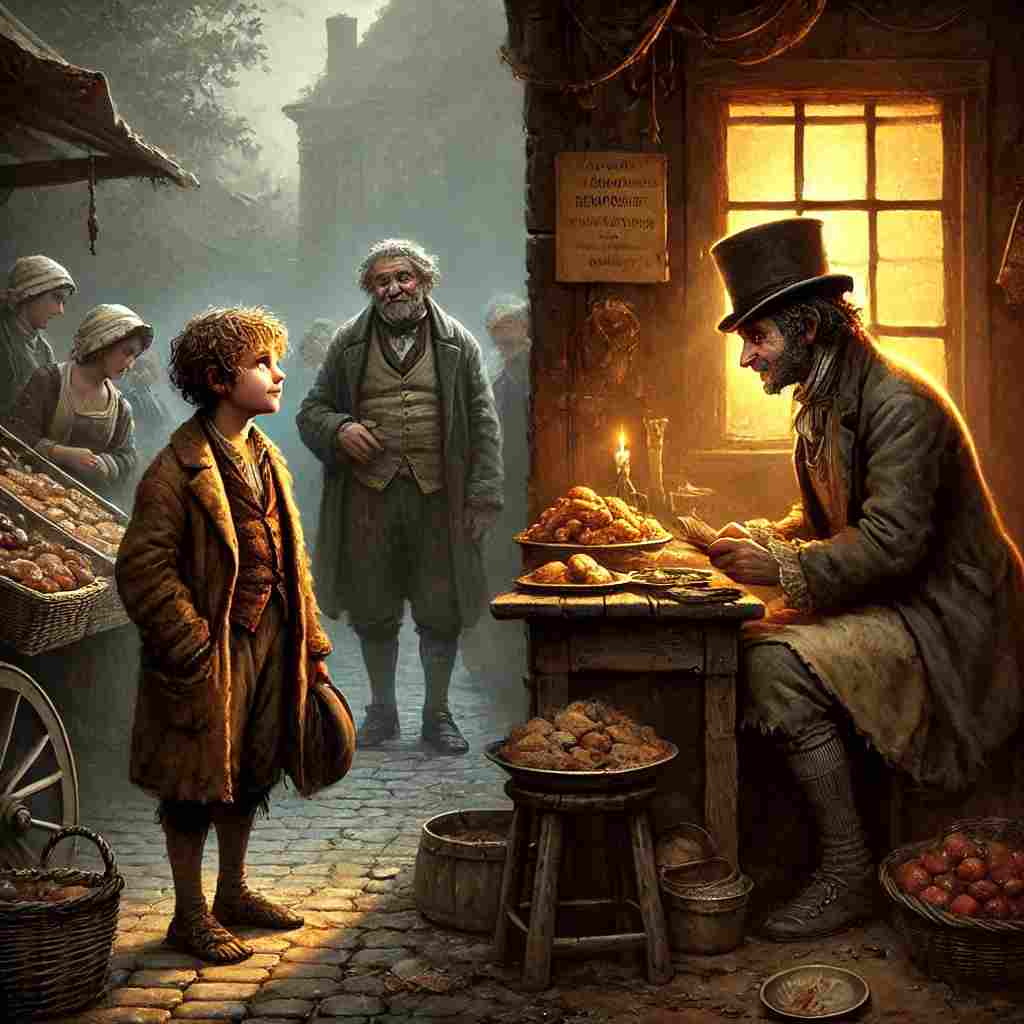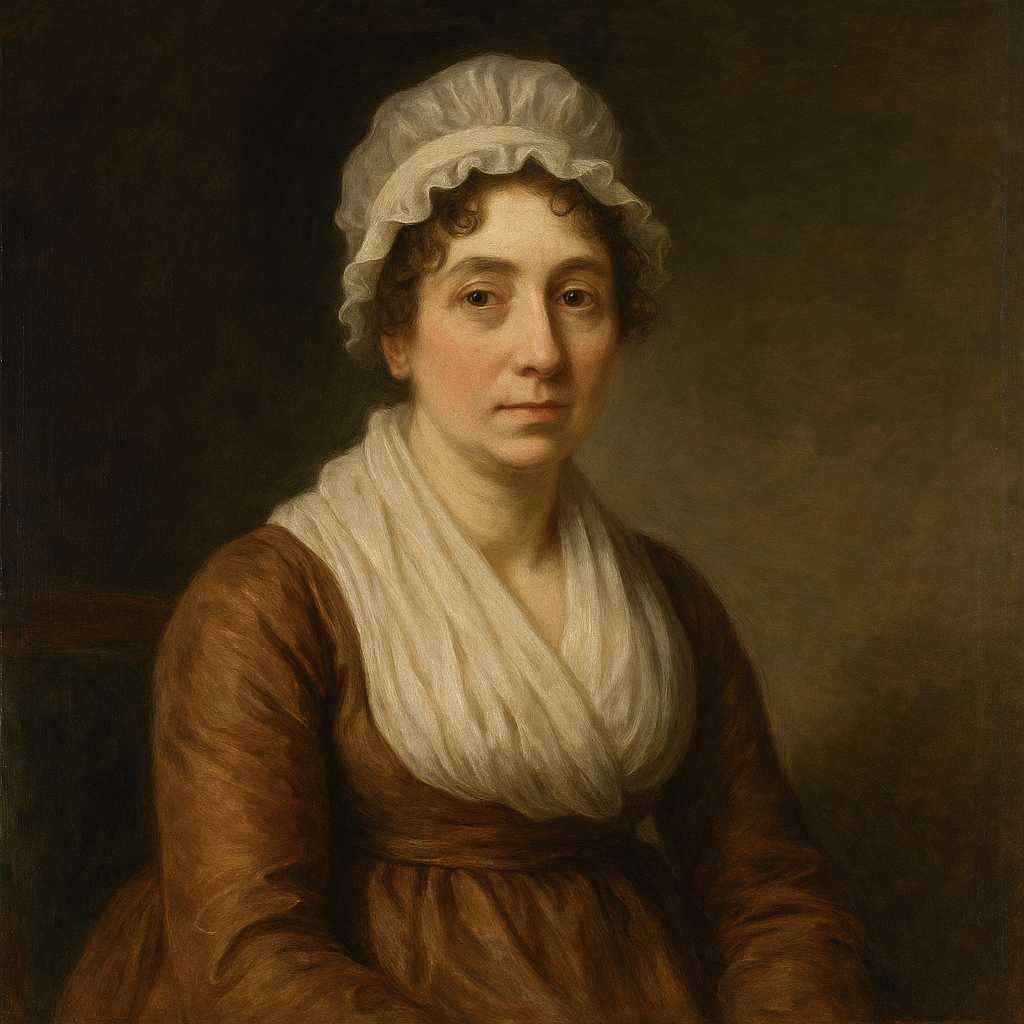The Two Boys
Mary Lamb
1764 to 1847

I saw a boy with eager eye
Open a book upon a stall,
And read as he’d devour it all;
Which when the stall-man did espy,
Soon to the boy I heard him call,
‘You, Sir, you never buy a book,
Therefore in one you shall not look.’
The boy passed slowly on, and with a sigh
He wished he never had been taught to read,
Then of the old churl’s books he should have had no need.
Of sufferings the poor have many,
Which never can the rich annoy.
I soon perceived another boy
Who looked as if he’d not had any
Food for that day at least, enjoy
The sight of cold meat in a tavern larder.
This boy’s case, thought I, is surely harder,
Thus hungry longing, thus without a penny,
Beholding choice of dainty dressed meat;
No wonder if he wish he ne’er had learned to eat.
Mary Lamb's The Two Boys
Mary Lamb’s poem The Two Boys presents a poignant commentary on the inequalities that pervade society, using two boys as symbols of deprivation and longing. Through vivid imagery and moral reflection, Lamb juxtaposes the intellectual hunger of a literate but impoverished boy with the physical hunger of another, highlighting how both forms of lack are exacerbated by societal structures. The poem employs a direct, conversational tone to evoke empathy and critique, while its deceptively simple language conveys profound social and emotional truths.
The Structure and Form
The poem is structured in two stanzas, each focusing on a different boy and his plight. The rhyme scheme follows an ababccd pattern, creating a sing-song rhythm that contrasts with the sobering subject matter. This tension between form and content mirrors the disparity between the boys’ yearnings and their realities, emphasizing their helplessness. The symmetrical structure—with one stanza dedicated to each boy—further reinforces the poem’s central theme of comparative suffering.
The First Boy: Intellectual Hunger
The first stanza introduces a boy captivated by a book on a stall. The opening lines—"I saw a boy with eager eye / Open a book upon a stall"—immediately evoke the boy’s thirst for knowledge. The metaphorical description of his reading, "as he’d devour it all," equates intellectual curiosity with physical appetite, underscoring the depth of his yearning. However, his enthusiasm is met with harsh rejection from the stall-keeper, who declares, “You, Sir, you never buy a book, / Therefore in one you shall not look.” The curt tone of the bookseller’s words highlights societal barriers to knowledge for the poor, as access to education and intellectual growth becomes commodified.
The boy’s sigh and his reflection—"He wished he never had been taught to read"—expose the cruel irony of his situation. While literacy is typically seen as empowering, for this boy, it only magnifies his awareness of what he lacks. Lamb suggests that the joys of learning and reading are tainted by economic deprivation, where opportunities are denied to those who cannot afford them.
The Second Boy: Physical Hunger
In the second stanza, Lamb shifts focus to a boy suffering from literal hunger. Unlike the first boy, whose deprivation is intellectual, this boy’s plight is visceral: "Who looked as if he’d not had any / Food for that day at least." The sight of “cold meat in a tavern larder” serves as a cruel reminder of what he cannot access. Lamb’s use of "enjoy" to describe the act of merely looking at the food is laden with irony, as enjoyment without consumption is inherently unattainable.
The boy’s imagined wish—“No wonder if he wish he ne’er had learned to eat”—parallels the first boy’s lament. Both boys express a desire to be free of their basic human needs—reading for one, eating for the other—because these needs are sources of pain when unfulfilled. Lamb thus highlights the universality of suffering among the poor, whether it arises from intellectual or physical deprivation.
Themes and Literary Devices
The poem grapples with themes of poverty, inequality, and human longing. Lamb uses contrast as a central device, placing the boys’ different experiences side by side to explore how deprivation manifests in diverse but equally devastating ways. The repetition of the phrase "wish he ne’er had learned" in both stanzas underscores the shared futility and despair of their situations.
Imagery is another key element. The book and the “choice of dainty dressed meat” symbolize unattainable desires, with their vivid descriptions reinforcing the boys’ longing. The "eager eye" and "hungry longing" personify their needs, making their suffering more palpable to the reader.
Lamb’s tone is both compassionate and critical. Her sympathetic portrayal of the boys invites the reader to empathize with their plight, while the depiction of the stall-keeper and the larder serves as an implicit critique of societal systems that prioritize profit and privilege over basic human needs.
Conclusion
Mary Lamb’s The Two Boys is a powerful meditation on the inequalities that define human experience. Through the juxtaposition of intellectual and physical hunger, the poem underscores how poverty robs individuals of both mental and bodily fulfillment. Lamb’s empathetic tone and keen observation reveal the systemic nature of these injustices, inviting readers to reflect on the societal structures that perpetuate such suffering. The poem, though simple in form, resonates deeply as a critique of social and economic disparities, remaining relevant in its universal themes.
This text was generated by AI and is for reference only. Learn more
Want to join the discussion? Reopen or create a unique username to comment. No personal details required!



Comments
No comments yet. Be the first to comment!